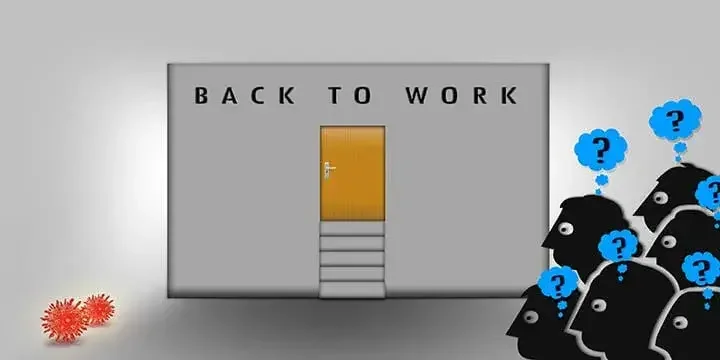With states reopening their economies, employers are beginning to call back their employees. There's work to be had. But some remote, furloughed, and former employees are hesitating.

A lot of people are making more with their unemployment benefits than they did at their jobs. For them, going back to work would mean a decrease in income. Others don't want to return out of fear that a coworker or someone in public transport will expose them to COVID-19. And a third group is apprehensive about returning to work because they have underlying medical conditions that make them high risk for complications should they contract the virus.
So, the question is: Can your employer force you to work? The short answer is—it depends.
Are you an essential employee?
"Each state defines who qualifies as essential employees," says Carlos Leach, founder and managing partner of The Leach Firm. There are 14 general categories, but not every state recognizes each one, and some states add others.
Examples of essential employees are healthcare workers, first responders, food and agriculture employees, water and sanitation, and critical manufacturing. These and other workers must report to work unless they are sick, have been exposed to the virus, or are normally covered by laws such as the Americans with Disabilities Act (ADA) or Family and Medical Leave Act (FMLA).
Do you have a contract?
"Even if you are not an essential employee, if your locality has reopened for business, your employer can require you to return to work if you work in an at-will state such as Illinois—unless you are protected by an employment contract or a federal, state or local law," explains Fern Trevino, leading plaintiff's employment lawyer at Law Offices of Fern Trevino.
Are you sick or have you been exposed to anyone who's sick?
If you have symptoms or have been exposed to someone with symptoms or who has the novel coronavirus itself, your employer will ask you to seek medical attention to determine whether you're fit for work.
If you're medically fit for work, don't have any exposure to COVID-19, and don't have any responsibilities related to COVID-19, your employer can force you to come to work, explains Leach.
Do you have to care for a parent or child affected by COVID-19?
"If you require child care because your child's school or child care is closed because of COVID-19, the newly passed Families First Coronavirus Response Act (FFCRA) provides expanded leave for employees working for employers with 500 or fewer employees," Trevino says. "The law also provides for paid leave because an employee or someone the employee is caring for is subject to a COVID-19-related quarantine or isolation order or [has] a recommendation by a health care provider [to isolate]."
What if I'm in a high-risk group or have a disability?
"If you have a qualifying disability under the ADA, you may be entitled to an accommodation, such as being able to work remotely," says Trevino. "For example, if you are a high risk for COVID-19 because you have an underlying condition that qualifies as a disability under the ADA, the employer may be required to accommodate your disability by allowing you to work remotely. If you have post-traumatic stress disorder and your condition would be exacerbated by fear of contamination in the workplace, your employer may be required to allow you to work remotely or in a more secluded area of the workplace unless it would be unduly burdensome on the employer."
If you work for an employer who is covered by the FMLA and you qualify for leave because you have worked for the employer for a year—or 1,250 hours—and you have a serious health condition, or you are the primary caregiver for a family member who has a serious health condition, you may be entitled to 12 weeks of leave under FMLA.
What if I'm simply scared to go back to work?
"If you are reluctant to return to work just because you fear contamination by COVID-19, you may be out of luck unless your employment contract allows you to work remotely, you require child care, or you or your family member has a qualifying disability," says Trevino.
Your employer may terminate you for refusing to come into work because work is available, you're not under contract, you're healthy, and you're not responsible for anyone affected by the novel coronavirus.
It would behoove you to go back to work as your unemployment insurance benefit will be canceled anyway. The Pandemic Unemployment Assistance (PUA) is only available when you meet the qualifying circumstances listed in the Coronavirus Aid, Relief, and Economic Security (CARES) Act.
For more information, contact your state labor office.

